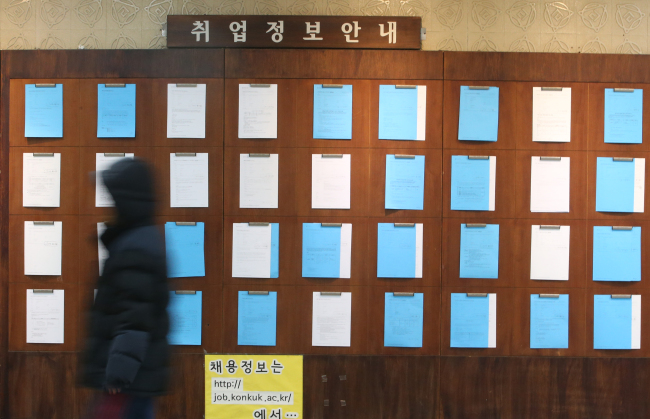Financial stress, such as unemployment and financial insecurity postretirement, is the biggest cause of anxiety among South Koreans, a new report showed Thursday.

The report, published by the Korea Institute for Health and Social Affairs, surveyed a total of 5,000 school children aged 14-18, as well as 7,000 adult Koreans aged 19 or older. Researchers showed that 43.7 percent of all surveyed adult Koreans were anxious because of financial insecurities.
The biggest portion of the adult participants, 25.3 percent, said they were anxious about their postretirement expenses, while 18.4 percent said they were anxious about unemployment, possible layoffs and insufficient income.
The research findings are similar to a 2012 study by the National Assembly Budget Office, which found that South Koreans in every age group -- except teenagers and children -- thought of committing suicide the most when they were faced with financial difficulties, from 2006-2012.
Notably, 48.9 percent of participants in their 30s, 40s and 50s said financial stress was their biggest cause of suicidal thoughts.
The research by KIHASA found that Koreans who are older, who have low income and low-education levels and those who have limited job security tend to suffer anxiety more often.
All participants in the survey were asked to rate their level of anxiety for their personal future and the future of Korean society on a scale of 1 to 10 -- 1 being the lowest anxiety level. The average anxiety rating for personal future was 5.4, while it was 5.6 for the future of the country.
Most, or 36.6 percent of the adult respondents, said they worried the most about the possible slowdown in economic growth in terms of South Korea’s future. The second largest 21.7 percent, said they were anxious about infectious diseases, such as the Middle East respiratory syndrome.
Children and teenagers, meanwhile, were seen to be more anxious about the future of society, rather than their own lives.
They gave an average of 4.7 points out of 10 in terms of anxiety felt for their own future, with the level being higher among girls (5.2) than boys (4.3).
The older they got, the more anxious they felt, which researchers said could be attributed to the stress that comes from moving from middle to high school, as well as from the pressure of preparing to enter university.
They gave an average of 6.6 points to the level of anxiety they felt for society, with the majority of them pointing to the country’s ever-changing school curriculum and standards for college entrance exams. They also cited politics, foreign affairs and overall security.
The research found that teenagers who have been bullied, who have low self-esteem, those who feel society is unequal and unsafe and those who have a diminished sense of belonging to their families and friends had a higher chance of suffering anxiety.
“This study suggests that special programs to deal with anxiety problems should be developed and implemented nationwide,” KiHASA researchers wrote in the report.
“Anxiety management should be included and acknowledged as mental health treatments.”
Overseas studies have shown that financial stress is linked to health problems like depression, indigestion and sleep disorders. Research by the Center for Credit Union Innovation and Filene Research Institute in Wisconsin, U.S., found in 2002 that chronic financial stress is linked to a cycle of increased workplace absenteeism, depression and poor workplace performance.
According to a report of the Organization for Economic Cooperation and Development released in 2015, an average of 29.1 Koreans in 100,000 committed suicide in 2012, the highest among developed nations and about 2.5 times higher than the OECD average of 11.9. Suicide was the fourth most common form of death in the country in the same year.
South Korea’s debt-to-gross domestic product ratio reached 180 percent, the highest in its history, in the third quarter of last year. According to Statistics Korea, a single Korean household on average had debt of 61.81 million won ($51,010) as of last year, and was spending 24.2 percent of their earnings to pay off their debt.
By Claire Lee (dyc@heraldcorp.com)











![[Today’s K-pop] BTS pop-up event to come to Seoul](http://res.heraldm.com/phpwas/restmb_idxmake.php?idx=644&simg=/content/image/2024/04/17/20240417050734_0.jpg&u=)





![[KH Explains] Hyundai's full hybrid edge to pay off amid slow transition to pure EVs](http://res.heraldm.com/phpwas/restmb_idxmake.php?idx=652&simg=/content/image/2024/04/18/20240418050645_0.jpg&u=20240419100350)

